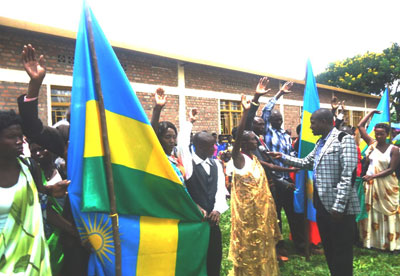Thousands of residents in Eastern Province gathered at different places to celebrate International Women’s Day on Saturday. This year’s celebrations were, however, unique as hundreds of couples that had been illegally married for years tied the knot in public. The ceremonies were conducted in various sectors across the province.


Thousands of residents in Eastern Province gathered at different places to celebrate International Women’s Day on Saturday.
This year’s celebrations were, however, unique as hundreds of couples that had been illegally married for years tied the knot in public.
The ceremonies were conducted in various sectors across the province.
Addressing hundreds of couples that tied the knot in a mass wedding organised by local leaders in Mugesera Sector in Ngoma District, MP Veneranda Nyirahirwa said the ceremony was a landmark in the community.
"Marriage indicates a deeper commitment so tying the knot is associated with better relationship among couples,” she said.
Nyirahirwa said Rwanda had achieved a lot in women empowerment, noting that the only remaining challenge was elimination of domestic violence.
"I am aware of some violence against women, perpetrated by husbands in rural homes. This must stop,” she said.
Dativa Muhorakeye, who tied a knot after living with her husband for 18 years, said she expected to live a better life henceforth.
"I think this gives me much respect as a wife. It is a great achievement. I have always been despised in the community because of living with a man I am not married to,” she told a cheering crowd.
A number of other couples, however, told The New Times that much as official marriage was necessary, timely divorce was equally needed.
Alexander Murekezi, 48, said couples in irreversible disagreement, conflicts and violence should be facilitated to divorce as soon as possible.
He warned that difficult and strained relationships were bad, adding that being single was better than being in a strained relationship.
"We have seen husbands kill wives and vice versa. This is because it takes long to allow divorce of couples who are no longer able to live together,” he said.
"‘Much as everyone would love to respect the ‘until death do us apart’ vow, there are at times circumstances that make it impossible for people to live together. Unless we adjust our marriage laws accordingly, I am afraid we shall go wrong,” he added.
Meanwhile, women in the province were advised to use their numerical advantage to spearhead development in communities.
Jean Marie Makombe, the Executive Secretary of the Province, said the leaders were sensitising women to keep on the right track, adding that most agriculture activities are carried out by women.
"Over 53 per cent of our population are women. This explains why we need their hand in development. Women should also make use of their numerical advantage to economically emancipate themselves,” he said.


